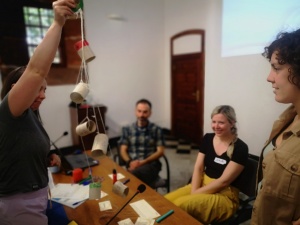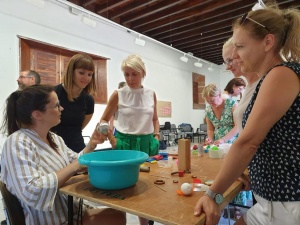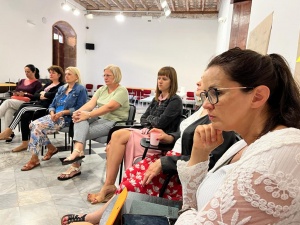In this course teachers will acquire new learning-by-doing and art-based teaching tools and develop their personal and social skills in order to understand and adapt to the realities of their disadvantaged learners such as migrants, refugees, asylum seekers and learners from low socio-economic backgrounds.
Taking into account the current situation with migrants, refugees, asylum seekers and post-crisis families with low socio-economic background, teachers need to develop their personal and social skills in order to be able to promote inclusive education.
This training course is for teachers who want to learn about different alternative methodologies that can be used to adapt teaching to the needs of learners from vulnerable backgrounds and have an inclusive approach in class. Teachers will learn how to apply various active learning methods in order to promote inclusion, tolerance, diversity and critical thinking. They will learn low-budget exercises and experiments that can be used to increase motivation, engagement and sense of belonging of learners, irrespective of their cultural, ethnic, socio-economic background or educational level. These active learning methodologies are adequate for teaching learners in their second language, multicultural classrooms or marginalized learners, as they focus on learning-by-doing and interactive exercises in small groups.
The nature of this course is highly practical and hands on, so the participants will experience themselves the creative techniques while also reflecting on how to apply them to their context.
Objectives
- Increase self-awareness about the realities of the different types of disadvantaged learners.
- Learn how to identify and reflect on the needs of vulnerable learners.
- Reflect on marginalization, isolation, learning in the second language and multiculturalism.
- Understand how to apply active learning methodologies with disadvantaged learners.
- Learn how to deliver low-budget exercises that increase motivation and engagement.
- Acquire knowledge on how to promote tolerance, diversity and critical thinking.
- Exchange best practices on how to handle difficult situations with learners and families from vulnerable backgrounds.
- Get inspired on how to encourage a stimulating and open learning environment and foster collective learning.
Target audience
- Teachers: pre-school, primary, secondary and vocational schools.
- Teacher trainers.
- School leaders and other school staff.
Any professional workers who work with learners from disadvantaged backgrounds.
For groups of 8 teachers or more, we adapt the course content and approach to the specific needs of your educational center and offer personalized funding assistance.
Training activities
Day 1 – Inclusive education
- Welcome to the course
- Ice breaking: Getting to know each other
- Concept mapping: What is inclusive education?
- Preliminary questions Method: Understanding the realities of disadvantaged learners
- Exercise: Active listening
- Group dynamics: Building trust in the group
- Case study: Refugees vs asylum seekers vs immigrants
- Exchanging good practices on how to handle difficult situations with learners and families from vulnerable backgrounds.
Day 2 – Active learning methodologies
- Warm up and team-building exercises
- Concept mapping exercise: What is active learning?
- Low-budget exercises: How to focus on learning by doing than speaking/writing
- Role play: learning in the second language in multicultural classrooms
- Group dynamics: Reinforcing trust and respect
- Group work and reflection: Marginalization and isolation
- Reflection exercises: How can I apply active learning in my class?

Day 3 – Experiential and Inquiry Based Learning
- Energizers and group division exercises
- Introduction to Kolb’s Experiential learning cycles
- Think-Pair-Share: Experiential learning for stimulating and engaging environments
- Exercises and group discussion: Teaching tolerance and diversity in multicultural classrooms
- Experiments and demonstrations: Practicing Inquiry Based Learning
- Group exercise: Teaching critical thinking through Inquiry Based Learning
- Group reflection: How to apply experiential and IBL in my class?

Day 4 – Art-based teaching
- Energizer and creative exercises
- Challenge in pairs and reflection: Non-verbal and para-verbal communication
- Exercise in pairs: The importance of eye-contact
- Exercise: Expressing emotions through music
- Using dance and bod movement exercises in multicultural classrooms
- Using the collage technique to understand the realities of disadvantaged learners
- Group reflection: How can I adapt art-based teaching approach in my teaching?
Day 5 – Networking and closing
- Energizer and quiz with Kahoot
- Group dynamics: Networking skills
- Open discussion on possible future collaborations and planning follow up activities
- Summary of key learning points
- Final course evaluation and feedback
- Validation of learning outcomes and handling certificates
- Cultural activity or guided visit (optional)

Methodology
We tailor our working methods based upon the participants‘ needs and professional profiles in order to ensure easier adaptability and application of the tools to the real life.
Our standard methodology is based on active learning and it is highly participative and practical. We have a hands on approach that comprises group exercises, role plays, experiments, case studies and simulation exercises. We use collaborative learning techniques to foster the exchange of good practices and collective learning.
The pedagogical methods used in this training course are based on experiential learning and learning by doing, Inquiry Based Learning and art-based teaching. Our focus is on showing the participants how the learners’ motivation increases when they become the actors of their own learning because the teacher takes the role of facilitator or learning guide. Thus, the participants get the chance to experience on themselves the benefits of the active learning methodology at the same time as learning how to apply it in their classroom.
Energizers, games and group dynamics are foreseen daily in order to ensure a positive energy and a cooperative learning climate in the group.
Group reflections and daily brief feedback sessions are planned to help adapting the learning programme to the specific needs of the participants.
We organize optional social and cultural activities in order to give the participants the opportunity to get to know the Canarian and Spanish culture as well as to do some professional networking and exchange good practices.
Certification and validation of learning outcomes
- Certificates of attendance
- Support with the Europass mobility certificates – to be issued by the applicant’s National Agency
Upon request, we also provide educational centers with additional documents that are required to certify the presence to the course and the competences learned. For example, we provide photos of the training course.
Pre-register to our course!
Write us some details about your project idea. How many participants do you want to send? What are the profiles of the teachers/staff interested in the course?
